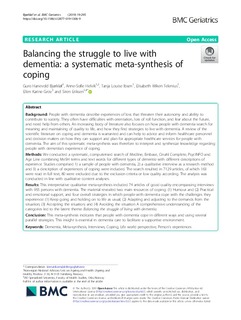| dc.description.abstract | Background: People with dementia describe experiences of loss that threaten their autonomy and ability to contribute to society. They often have difficulties with orientation, loss of roll function, and fear about the future, and need help from others. An increasing body of literature also focuses on how people with dementia search for meaning and maintaining of quality to life, and how they find strategies to live with dementia. A review of the scientific literature on coping and dementia is warranted and can help to advice and inform healthcare personnel and decision makers on how they can support and plan for appropriate healthcare services for people with dementia. The aim of this systematic meta-synthesis was therefore to interpret and synthesize knowledge regarding people with dementia’s experience of coping.
Methods: We conducted a systematic, computerised search of Medline, Embase, Cinahl Complete, PsycINFO and Age Line combining MeSH terms and text words for different types of dementia with different descriptions of experience. Studies comprised 1) a sample of people with dementia, 2) a qualitative interview as a research method and 3) a description of experiences of coping were included. The search resulted in 7129 articles, of which 163 were read in full text, 80 were excluded due to the exclusion criteria or low quality according. The analysis was conducted in line with qualitative content analyses.
Results: This interpretative qualitative meta-synthesis included 74 articles of good quality encompassing interviews with 955 persons with dementia. The material revealed two main resources of coping: (1) Humour and (2) Practical and emotional support, and four overall strategies in which people with dementia cope with the challenges they experience: (1) Keep going and holding on to life as usual; (2) Adapting and adjusting to the demands from the situation; (3) Accepting the situation; and (4) Avoiding the situation A comprehensive understanding of the categories led to the latent theme: Balancing the struggle of living with dementia.
Conclusion: This meta-synthesis indicates that people with dementia cope in different ways and using several parallel strategies. This insight is essential in dementia care to facilitate a supportive environment. | nb_NO |
